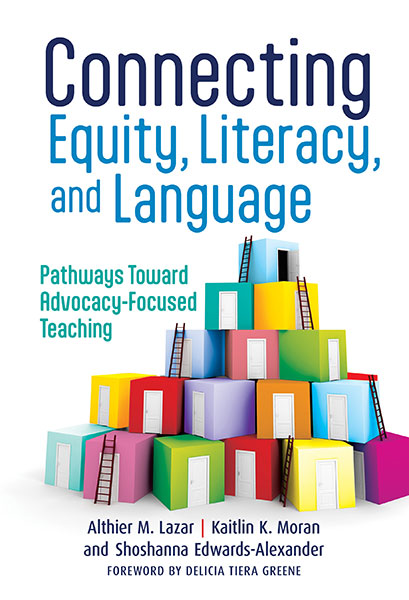Professors: Request an Exam Copy
Print copies available for US orders only. For orders outside the US, see our international distributors.
Althier M. Lazar, Kaitlin K. Moran, Shoshanna Edwards-Alexander
Foreword by: Delicia Tiera Greene
Publication Date: December 22, 2023
Pages: 160
Series: Language and Literacy Series

This book shows literacy professionals how to develop the dispositions and actions associated with advocacy-focused teaching. While portraits of culturally conscious literacy teachers are now readily available, becoming such a teacher continues to be a challenge. Drawing from 60+ years of experience working with teacher candidates and teachers in the city of Philadelphia, the authors argue that becoming an advocacy-focused literacy teacher requires making moral commitments to students and developing professional competencies that fuse literacy, language, and equity studies. Recognizing that educators can be overwhelmed trying to match the realities they face daily with the theory behind good practice, Connecting Equity, Literacy, and Language packs a lot of big ideas into one readable, concise book that is perfect for use in literacy methods courses. The text includes definitions and examples of equity concepts, relatable teacher vignettes, and “Pause and Reflect” boxes to encourage reflection and classroom conversation.
Book Features:
Althier M. Lazar is a professor of education at Saint Joseph’s University. Her books include Culturally Sustaining Literacy Pedagogies, Schools of Promise for Multilingual Students, Bridging Literacy and Equity, and Practicing What We Teach. Kaitlin K. Moran is an assistant professor of teacher education at Saint Joseph's University. Shoshanna Edwards-Alexander is a clinical assistant professor of social work for the School of Education and Human Development at Saint Joseph's University.
“Lazar, Moran, and Edwards-Alexander manage to convey a lot of information in a very short, very readable book that is full of enlightening details and examples. Connecting Equity, Literacy, and Language is a welcome addition to the growing treasure trove of books that will help teachers teach toward a more just, equitable society.”
—Illinois Reading Council Journal
“The authors call on us to engage in the difficult and vital work necessary to dismantle systems that fail Black and Brown children.”
—From the Foreword by Delicia Tiera Greene, assistant professor, University at Albany, SUNY
“The authors understand that becoming an advocacy-focused educator requires more than pedagogical knowledge. To create the schools our children deserve, we need the advocacy-focused educators that this book highlights—educators who are brave, thoughtful, curious, humble, bold, and always in a state of becoming. With examples pulled from the equity-oriented journeys of teachers and with numerous invitations to pause and reflect, this book will help you discover and grow your own ‘why’ as an advocacy-focused educator. This is essential reading for educators at all stages of their careers.”
—Kelly Wissman, associate professor, University at Albany, SUNY
“Connecting Equity, Literacy, and Language: Pathways Toward Advocacy-Focused Teaching is a book that I wish I had read as a novice teacher. While many texts argue for equity in schools, few provide clear paths forward. This book focuses on the journey, exploring not only how literacy and language are related to equity, but also how educators can prepare themselves for working with children and families. Across the text we meet a stunning group of educators who are moving forward in creating equitable classrooms and becoming advocates for all children. Teachers will learn much from their stories.”
—Catherine Compton-Lilly, John C. Hungerpiller Professor, University of South Carolina
Contents
Foreword Delicia Tiera Greene ix
Acknowledgments xi
Introduction 1
Our Purpose 1
Structure of the Book 3
Who We Are 4
1. A Need for Advocacy-Focused Literacy Educators 7
A Reckoning 7
The Teacher Education Gap 11
Teacher Development: Building Commitments and Competencies 13
Connecting Equity, Literacy, and Language in a Landscape of Practice 17
Conclusion 20
2. Understanding Ourselves and Others 21
Developing a Critical Awareness of Race 21
A Pathway to Understanding 25
Stumbling and Getting Back Up Again 27
Developing a Critical Awareness of Culture 29
Developing a Critical Awareness of Intersectionality 33
Conclusion 35
3. Inequities in Schools and Classrooms 36
Pushing Kids Out of School 37
Limitations of Literacy Curricula and Assessment 40
Literacy Teaching Routines and Structures 44
Deficit Descriptions and Approaches 46
Conclusion 49
4. Racism in Schools and Society 51
The Invention of Race: A Brief History 51
The Impact of Racial Categorizations 53
Misinterpreting Critical Race Theory and the Need to Address Racism in School 57
Literacy Educator Activism: Noticing, Questioning, Challenging 61
Conclusion 63
5. Many Literacies and Languages 65
Rethinking Perspectives About Literacy and Language 65
Autonomous and Ideological Conceptions of Literacy Revisited 67
A Bit of History: The Heath Study 68
Critiquing the “Word Gap” Research 70
Englishes, Raciolinguistics, and Code-Meshing 71
Multilingualism, Dynamic Bilingualism, and Translanguaging 75
Conclusion 77
6. Toward Culturally Centered Teaching 79
Meet Cecilia 80
Meet Andrea 84
Examining Teachers and Teaching Through Advocacy-Focused Frameworks 88
Seeing Teachers Within and Beyond Frameworks 93
Conclusion 94
7. Toward Critical Teaching 95
Critical Literacy: Questioning Texts and the World 96
Meet Jennifer 99
Revisiting Andrea 101
Youth and Educator Activism 103
Revisiting Cecilia 103
Meet Burton 104
Connecting With Established Organizations 106
Conclusion 108
8. Pathways Toward Advocacy-Focused Teaching 110
Noticing Inequities and Envisioning Change 110
Noticing Inequities and Forging Change 113
Meet Kristin 114
Next Steps 118
Your Path Begins With You 118
Envision and Forge Change 120
Putting It All Together 124
References 127
Index 139
About the Authors 145
Professors: Request an Exam Copy
Print copies available for US orders only. For orders outside the US, see our international distributors.